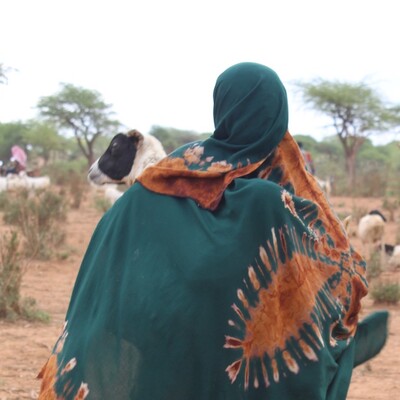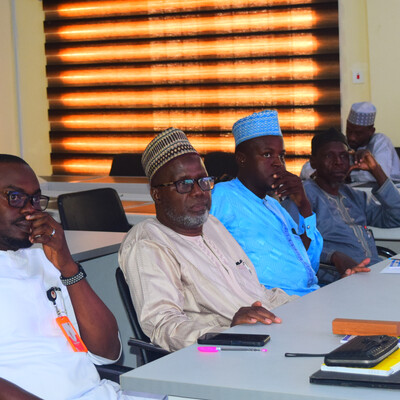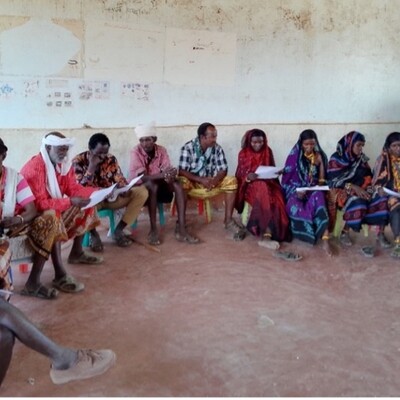
How can a new narrative on pastoralism influence development policy and practice?
Stakeholders come together to discuss research and development policy to support pastoralism
In the face of climate and economic uncertainty, reframing the narrative to better include pastoralism in development policy is paramount for creating sustainable and equitable food systems. In Addis Ababa, Ethiopia, this was core to the conversation as policymakers, public officials, pastoralist representatives, experts and researchers convened for a three-day workshop in March 2023. Their mission was to explore how development policy can better accommodate the complexity, flexibility and adaptive capacity of pastoral systems.
Supporting an Under-Appreciated but Essential Livelihood
Pastoralism is a livelihood that works with the variability in rangelands, which cover 54% of the world’s land surface, to produce animal source foods often where no crops can grow. They are significant contributors to many countries’ economies. In Africa alone, some 270 million pastoralists provide more than half of the continent’s meat and milk. Pastoralists are also natural stewards of the land, providing important ecosystem services, such as maintaining grasslands and carbon sequestration, maintaining and even increasing biodiversity, cycling nutrients and removing biomass to prevent fires. But pastoralism is facing increasing climate- and policy-related pressure and challenges – from increased competition for pastures to policies that lump all livestock rearing together – putting the next generation of pastoralists at risk of losing their livelihood.
It is these dilemmas that stakeholders at the workshop were determined to address. ‘My hope is that your deliberations here will synthesize the information you have generated so that pastoralist communities can benefit,’ said Namukolo Covic, ILRI’s Director General’s Representative to Ethiopia, CGIAR Ethiopia Country Convenor and CGIAR Regional Director for East and Southern Africa. She also emphasized the need to better include pastoralist communities in the discussion at the United Nations 28th Conference of Parties (COP28), building upon the successful inclusion of food systems for the first time in COP27.
New Narratives for Pastoralism and Development Policy

The workshop was co-hosted by ILRI’s Global Livestock Advocacy for Sustainable Development project and PASTRES. The core objectives for the workshop were to link research to policy and practice and to bring new narratives emerging from research to explore ways of thinking about pastoral development that incorporates principles of flexibility, multiplicity and uncertainty. ‘Storylines that define a problem in a particular way define the solutions that follow,’ said Professor Ian Scoones, principal investigator of the PASTRES project.
Scoones further explained that a new narrative means ‘understanding pastoralism as a modern system embedded in social narratives and networks.’ This understanding varies from the old narrative that lumps pastoralism together with other livestock production systems such as industrial farming. The old narrative also tries to develop policies that are rigid, fixed and bounded that don’t account for the intrinsically complex, flexible and adaptive nature pastoralists adopt to navigate uncertainties.
The new narrative was explored through the core research areas of the PASTRES project – mobility of people and animals, land and the environment, markets and livelihoods and social protection and insurance and explored how the research can better inform stakeholders.
The first research theme, mobility, is the ‘key way pastoralists adapt to uncertainties,’ said Natasha Maru, PhD, policy consultant and communications, outreach and engagement manager of the PASTRES project. She highlighted that pastoralists practice mobility to take advantage of the uneven distribution of precipitation and forage and the realities of policy and market opportunities.
Next, Palden Tsering, researcher and PhD with the PASTRES project, spoke of the need to include pastoralists in the conversation about policy practices related to land and the environment. ‘We need to think like pastoralists, not just see like pastoralists,’ to ensure policies don’t have unexpected outcomes that hinder the livelihood. His research, focusing on Tibet, underscored the need to broaden perceptions of land conservation. The status quo tends to be exclusionary to pastoralists, separating culture and nature. A new roadmap must include non-official authorities in the negotiation process, such as chiefs, group ranch representatives, pastoralists and grazing committees.
Additionally, markets are key for pastoralists but are also sites of uncertainty and power concentration, especially in a global economy. Giulia Simula, facilitator for civil society engagement in food governance and PASTRES PhD, discussed markets and uncertainty through the lens of the Sardinia pastoralists and cheese production. She emphasized the need for pastoralists to be embedded and formalized in global commodity chains but also allow for the preservation of informal markets to provide security in uncertain times. For example, she spoke of how pastoralists in Sardinia interact with artisanal and industrial markets, selling cheese directly to consumers and milk for the industrial value chain. This flexibility allows for diversity in income.
Finally, Tahira Shariff Mohamed, researcher with the Australian Centre for International Agricultural Research and PASTRES PhD, spoke on social protection and insurance to improve livelihoods in the face of uncertainty. Understanding and integrating local collective forms of social protection into market-based systems is necessary, Mohamed said. Actions such as livestock insurance and mobile money need to complement community practices like loaning animals and elder knowledge. The research themes highlighted the need to more greatly understand and tailor policies to fit the adaptive qualities of pastoralism and transform the way in which stakeholders see pastoralism in food systems.
Linking Research to Development Policy
The final portion of the discussion consisted of reflections by policymakers and public officials. The common themes that emerged surrounded better inclusion of pastoralism both in shifting government policies and narratives.
Abhijit Mitra, Commissioner for Animal Husbandry and Chief Veterinary Officer at the Department of Animal Husbandry under the Indian Ministry of Fisheries, Animal Husbandry and Dairying, commented on the need for research to influence government policies. As a liaison between research and government, he has applied findings to change India’s approach to pastoralism. For example, pastoralists will be included in the 2024 census after previously being excluded.
Anna Okello, research program manager for livestock systems at the Australian Centre for International Agricultural Research, emphasized the need for new narratives that recognize the importance of pastoralism falling on new ears; such that in the past, old ears have failed to incorporate updated understandings of pastoralism in policy and programmes despite having evidence from research. Including more people in the conversation is necessary to spread new narratives and the importance of pastoralism and livestock for the world.
Finally, Guyo Roba, Head of the Jameel Observatory, discussed how the new narratives show the cross-cutting issues in pastoralism across the world. He stressed that pastoralists need to be included not only in research but also in the action space where decisions are made.
Covic concluded the event with a challenge to participants: to ensure that the evidence discussed in the workshop informs programs in the countries where it was generated, infuse additional attention to pastoralism in the UN Food Systems Summit and engage with COP28 so that pastoralism can become part of the discussion.
For more information on the online pastoralism photo exhibition visit https://seeingpastoralism.org/.




















